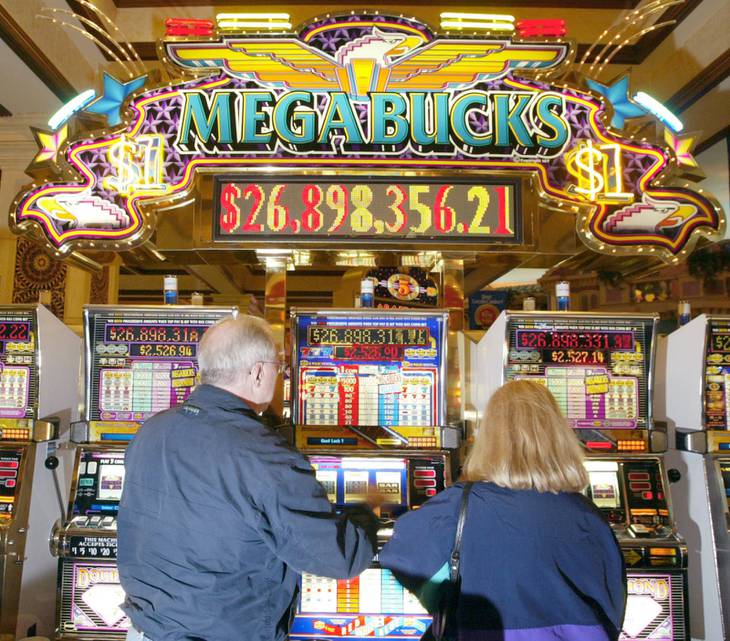Archives
- $54.3 million on the line in jackpot dispute (12-30-2011)
- Slot player continues legal battle over disputed jackpot (11-21-2000)
- Trial begins on disputed jackpot (10-01-1999)
- LV firm avoids paying disputed jackpot (06-18-1999)
- More business news
- More gaming news
Most people who spend time playing slot machines have stories about the jackpot that got away.
The symbols on the reels line up, then at the last second, one moves. Or the symbols line up but the necessary number of credits weren’t played — even though the player has been betting the maximum all day. Or the catch-all: There must have been some kind of glitch with the machine.
Gamblers with those stories likely will feel for William Monsoor.
The Eugene, Ore. resident was playing slots at the Riverside Resort in Laughlin in September when he thought he won a Toyota Prius worth $24,509.
He didn’t, according to the state Gaming Control Board. A hearing officer invalidated Monsoor's "win" last year, a decision that was affirmed earlier this month by the three-member board.
The Control Board receives about 100 complaints a month about contested wins. Two hearing examiners have conducted 32 hearings on them since July.
“I’ve done hearings for as little as 25 cents to as much as $43 million and everything in between,” said Richard DeGuise, the Southern Nevada hearing officer.
Most of the decisions side with the casino and uphold the house's contention that a player didn’t win a jackpot. But that’s often because, by the time a case gets to DeGuise, the player, casino and Control Board already have reached a resolution.
“By the time a case gets to me, I’m dealing with the folks who don’t take no for an answer, no matter what,” DeGuise said.
When a player dispute occurs, casinos must call regulators.
“Everything is frozen in time, and the casino’s responsibility is to notify the board immediately," Control Board Chairman A.G. Burnett said. "We come in and discuss the matter with the casino and the patron who is aggrieved and look at the machine or whatever is at issue, and an investigation is conducted.”
Control Board investigators are stationed in cities across the state and must be available around the clock. When a dispute occurs, casino floor managers or pit bosses call them to the scene to discuss what happened.
Sometimes, a problem can be spotted immediately and the case is resolved before the Control Board investigator arrives. Sometimes, casinos offer to settle voluntarily.
“They’ll review the video evidence, and that’s usually pretty conclusive,” Burnett said.
High-tech slot machines create a record of every spin, and it’s often just a matter of accessing the data to see what happened.
Just like in a police investigation, investigators gather evidence and take statements from both the player and the casino. If there’s no resolution, the evidence is turned over to the hearing examiners, who build case files and schedule hearings within 25 days of the incident.
The hearing occurs at Control Board offices and both representatives of the casino and the player attend. Players can have an attorney represent them or appear on their own behalf. They also can participate by telephone.
DeGuise and his northern counterpart, Keith Henry, were trained at the National Judicial College at UNR. Hearing examiners work independent of the Control Board’s Enforcement Division, like administrative law judges, serving as judge and jury for cases.
At the end of a hearing, the examiners submit reports outlining their findings. The document then becomes a public record.
Hearings conducted by an examiner result in reports that go to Control Board regulators who review appeals at their monthly meetings.
In January, there were four appeals, including Monsoor’s. It took just a minute and a half for the board to affirm the hearing examiners’ decisions on all four cases.
Appeals were lodged by players against Club Cal-Neva in Reno, Caesars Palace and Red Rock Resort in Las Vegas, as well as the Riverside for Monsoor’s case.
DeGuise concluded that Monsoor, who was playing an IGT Used Cars video reel penny slot machine, didn’t understand the pay-line pattern on the machine and misinterpreted one of his spins as a win. The machine has five reels and 15 pay lines.
Monsoor complained that the slot machine’s help screen doesn’t spell out exactly what had to occur for a player to win the car.
Players whose appeals are rejected by the Control Board can appeal the decision to District Court. Monsoor hasn’t indicated whether he would appeal.
